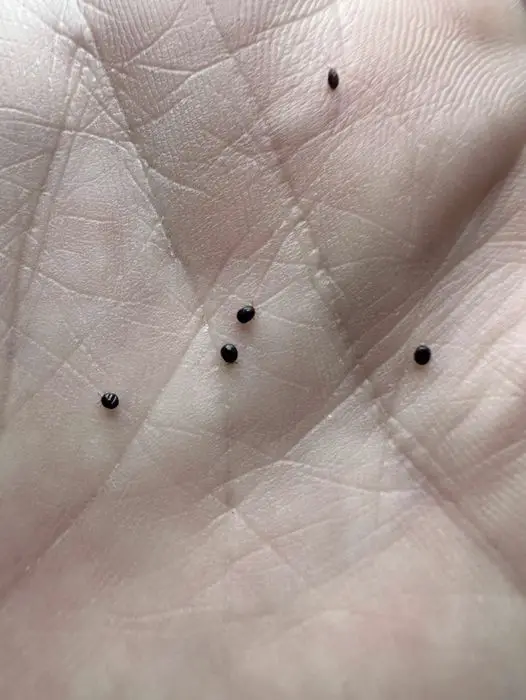The Threat of Tick Eggs in Your Garden
As much as we love spending time outdoors, particularly in our gardens, there’s a silent threat that many of us might overlook—tick eggs. These tiny clusters may seem harmless, but they are a precursor to a much larger problem: a tick infestation. Ticks are not just annoying; they are dangerous parasites capable of transmitting serious diseases to both humans and animals. Lyme disease, Rocky Mountain spotted fever, and other tick-borne illnesses can have severe consequences, making it crucial to address this issue promptly.
Understanding the Enemy: What Are Tick Eggs?
Ticks are small arachnids that survive by feeding on the blood of mammals, birds, and sometimes reptiles and amphibians. What makes them particularly dangerous is their ability to transmit pathogens that can cause severe illness. The problem often starts with their eggs. Female ticks lay thousands of eggs at once, usually in hidden spots like leaf litter, tall grass, or garden mulch. These eggs are usually reddish-brown, often appearing in clusters that resemble small pearls. While they may be difficult to spot, identifying them is the first step in preventing a tick infestation.

The Risks of Ignoring Tick Eggs
Ignoring tick eggs in your garden can lead to a full-blown infestation. Once hatched, the larvae are almost impossible to see with the naked eye but can latch onto you or your pets unnoticed. As they grow and mature, they move through various life stages, each capable of transmitting disease. The sheer number of eggs a single tick can lay means that even a small cluster can quickly turn into a significant problem, especially in warm, humid environments where ticks thrive.
Steps to Remove Tick Eggs Safely
If you find tick eggs in your garden, it’s vital to act immediately. Here’s a step-by-step guide on how to deal with them:
- Gear Up for Safety: Wear gloves and long sleeves to protect your skin from coming into direct contact with the eggs. Some people also wear a mask to avoid inhaling any potential allergens or harmful substances.
- Careful Collection: Use a small jar or container filled with rubbing alcohol. Carefully scoop the eggs into the jar. The alcohol will kill the eggs almost instantly.
- Disposal: Once you’ve collected all the eggs, seal the jar and dispose of it safely. Don’t simply throw it in the trash; instead, consider taking it to a hazardous waste facility.
- Clean the Area: After removing the eggs, clean the area thoroughly. A mixture of water and a pesticide like permethrin can be effective. However, use pesticides with caution, following all safety guidelines and instructions on the label.
- Monitor the Area: Keep an eye on the area where you found the eggs. Regularly inspect for any new clusters or signs of ticks. This is especially important during the warmer months when ticks are most active.
Prevention Is Better Than Cure
While dealing with tick eggs when you find them is crucial, preventing them from appearing in the first place is even better. Here are some preventive measures you can take:
- Maintain Your Garden: Keep your lawn mowed and bushes trimmed. Ticks thrive in tall grass and overgrown areas, so regular maintenance can help reduce their habitat.
- Create a Barrier: Consider placing a barrier of wood chips or gravel between your lawn and wooded areas. This can help prevent ticks from migrating into your garden from nearby wooded areas.
- Use Tick Repellents: When spending time outdoors, especially in wooded or grassy areas, apply tick repellent to your clothing and gear. This can significantly reduce the risk of ticks attaching to you.
- Protect Your Pets: Ensure your pets are treated with veterinarian-approved tick prevention products. Pets are often the first to bring ticks into the home, so keeping them protected is essential.
- Regular Inspections: After spending time outdoors, inspect yourself, your family, and your pets for ticks. Pay special attention to areas like behind the ears, around the waist, and between the legs where ticks are likely to attach.

The Importance of Professional Help
While it’s possible to deal with tick eggs and ticks on your own, sometimes the infestation can be too large or too risky to handle without professional help. Pest control services have the expertise and equipment to effectively manage tick infestations, ensuring that your garden and home remain safe. They can also provide advice on long-term prevention strategies tailored to your specific environment.
Conclusion: Stay Vigilant and Proactive
Discovering tick eggs in your garden is not something to take lightly. While it may be tempting to ignore these tiny clusters, doing so can lead to a larger, more dangerous problem. By taking immediate action to remove the eggs and implementing preventive measures, you can protect yourself, your family, and your pets from the dangers ticks pose. Remember, in the battle against ticks, vigilance and prompt action are your best allies. Keep your garden a safe, enjoyable space by staying informed and proactive against these unwelcome invaders.

